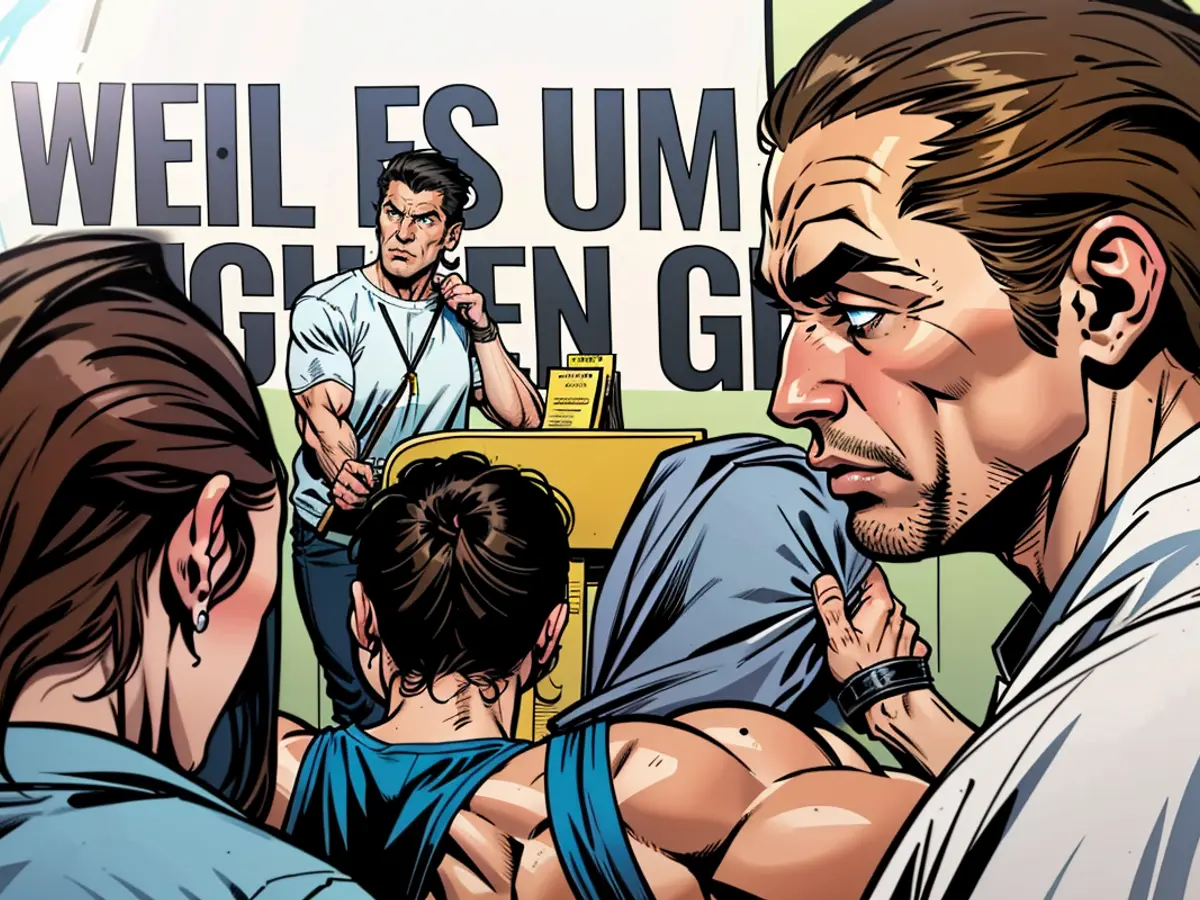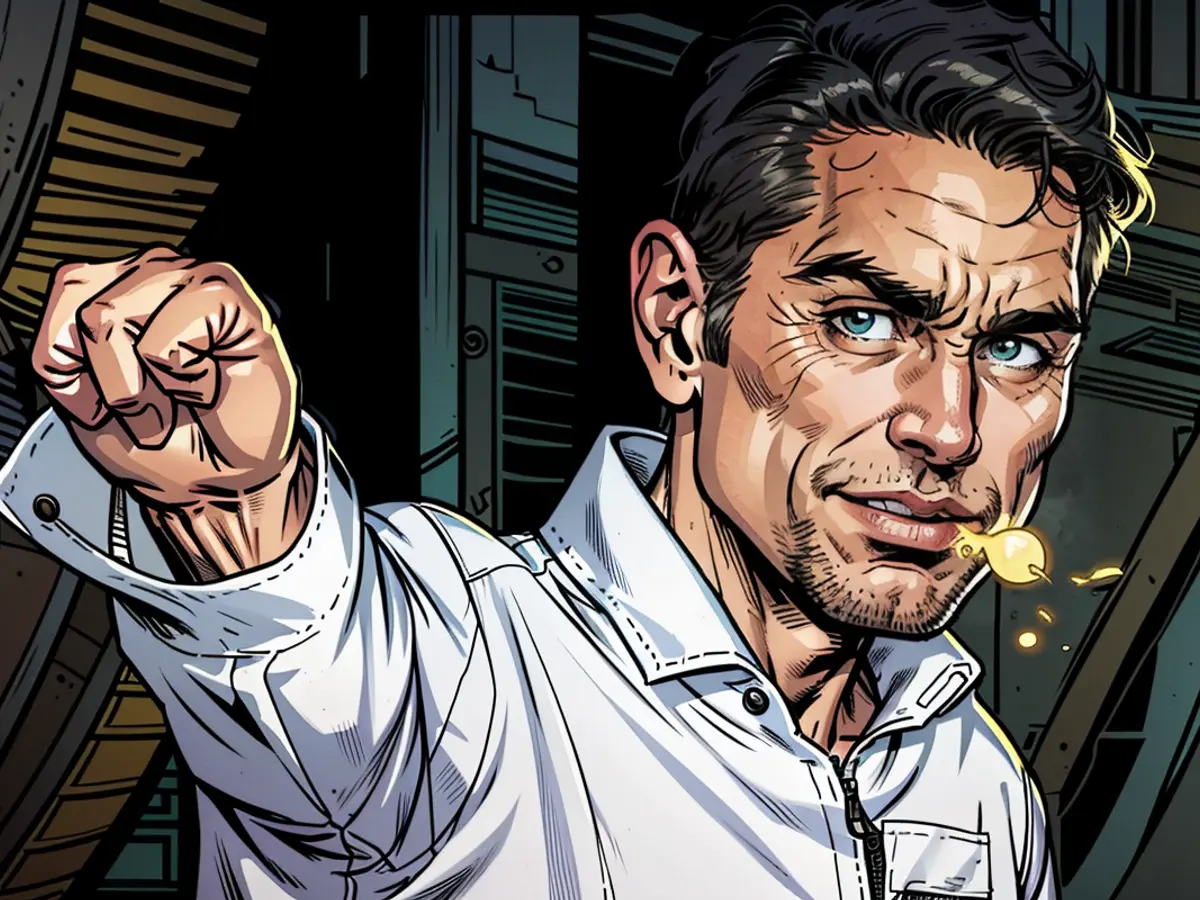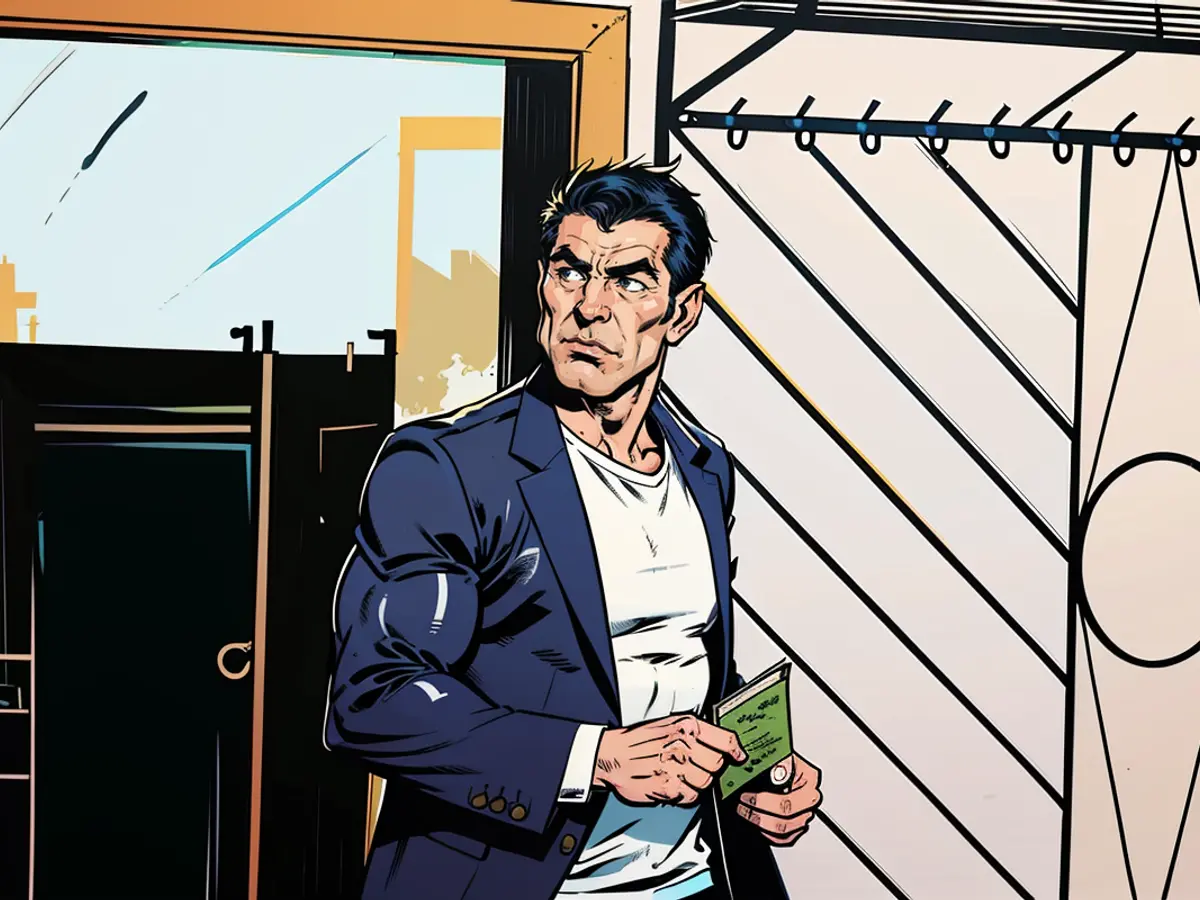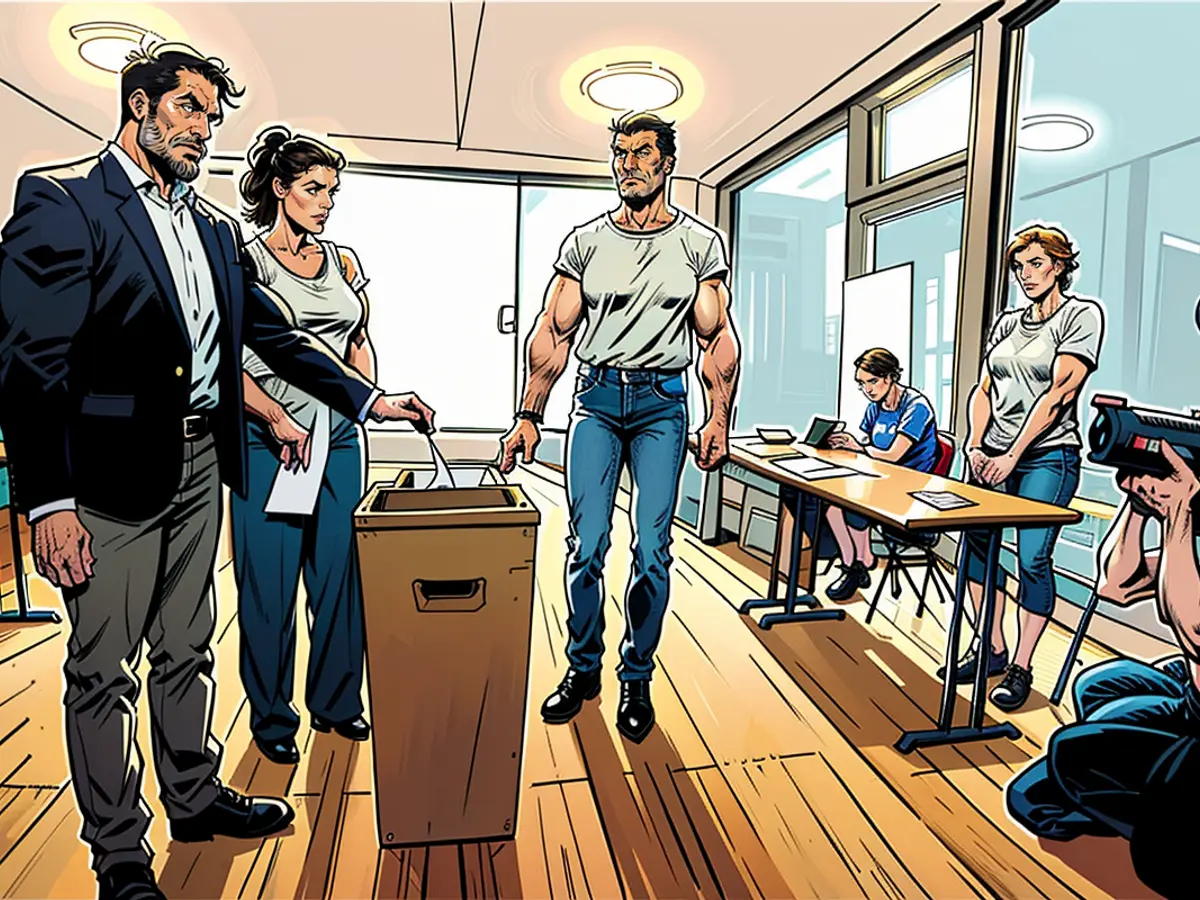At 18:33, the leader of AfD, Weidel, alleges the government's involvement in their party)
18:30 SPD Chief: "Risk of Being Kicked Out of State Parliament" SPD Secretary-General Kevin Kühnert admitted his party's modest performance in Thuringia and Saxony's elections. He commented on ARD, stating, "This isn't a night for celebrating the SPD." Over the years, the party has faced numerous challenges. Kühnert acknowledged, "There was a serious risk of being expelled from the state parliaments." He emphasized, "Fighting is worth it, we're needed." Changes are essential, with Kühnert suggesting more transparency and listening to voters. Regarding the chancellor, Olaf Scholz, Kühnert mentioned, "We have to collectively explain our politics."
18:23 Höcke Hails Thuringia Result as "Historic Win" AfD parliamentary group leader Björn Höcke regarded Thuringia's result as "historic," making a clear statement on MDR. The AFD emerged as the number one party in the state, and Höcke concluded, "The misguided 'firewall nonsense' should cease."
18:23 Chrupalla: "Neck and Neck with CDU" AfD party leader Tino Chrupalla considered his party's performance in Thuringia spectacular, remarking on ZDF that the voter's will calls for a political shift in both regions. The AfD is open to talks with all parties, expressing, "In Saxony, we're nearly tied with the CDU." They aim to make politics favorable to Saxony.
18:17 Linnemann: "No Coalition with AfD" CDU Secretary-General Carsten Linnemann dismissed any possibility of coalitions with the AfD in Thuringia or Saxony on ARD. He remained firm, "We're firm on that matter." The CDU will form governments from the middle of the parliament, he believed, being optimistic about their prospects.
18:13 Initial Projection: CDU Narrowly Ahead in Saxony The first projection for the Saxony state election indicates the CDU leading with 31.5% of votes. The AfD follows closely with 30%, the BSW ranks third with 12%. Despite losing votes compared to 2019, the SPD and the Greens still enter the state parliament with 8.5% and 5.5%, respectively. The Left and the FDP do not join the new parliament.

18:10 Initial Projection: AfD Leads in Thuringia In the initial projection for Thuringia's state election, the AfD emerges as the leading party with 30.5% of votes. The CDU comes second with 24.5% and the Left with 12.5%. Voters support the SPD with 7%, securing their seat in the state parliament. BSW is confident to enter the parliament with 16%. The Greens and the FDP are under 5%.
18:01 AfD Wins Thuringia, BSW Boosts in Saxony The AfD wins the expected top-spot in Thuringia. Despite clearing the 5% threshold, the SPD and the FDP fail to win. Saxony's BSW achieves a double-digit result in the state election. The CDU leads narrowly over the AfD, with the Left and the FDP being omitted from the state parliament.
16:48 Höcke's Possible Exclusion from State Parliament AfD Thuringia's faction leader, Björn Höcke, is at risk of losing his seat in the future state parliament. His successful colleagues could potentially undermine his chances. Reportedly, several AFD candidates are in a strong position to secure direct representation, while Höcke faces challenges in his constituency, Greiz II, compared to CDU candidate Tischner. If Tischner wins and the AFD secures excessive direct mandates, no one can join through the state list, not even from the top, threatened by Höcke. The AFD might then negotiate for a successful direct candidate to surrender their seat for Höcke to secure his mandate.
16:29 Saxony Sees 25% Vote by Mail For Saxony's critical election, former CDU Minister President Michael Kretschmer, nearly a quarter of eligible voters have cast their ballots via mail. The state election supervisor projects 24.6% of voters to vote beforehand. The early afternoon turnout today is only slightly higher than in 2019.

16:08 Media Ban at Thuringia AfD Gathering There's a strong probability that the media won't cover the Thuringia AfD's celebration event, if the party's initial plans hold true. AfD, classified as right-wing extremist by the domestic intelligence agency, seeks to exclude certain media outlets from the celebration, but a court prevents this action. As a response, the State AfD barred all journalists from attending the event, citing space concerns, as too many applied for accreditation.
15:52 Höcke casts vote in a Lada, Ramelow votes with wife in ErfurtThuringia's AfD leader and top candidate, Björn Höcke, voted this morning at his polling station in Bornhagen, Eichsfeld district. The 52-year-old arrived in a Lada Niva, a Russian-made off-road vehicle. On the other hand, Thuringia's Minister President Bodo Ramelow, who is 68, voted in the state capital of Erfurt with his wife, Germana Alberti vom Hofe. He has been leading the Free State since 2014, recently heading a minority coalition.
15:40 Higher voter turnout than in 2014In Thuringia, 44.4% of voters had cast their ballots by 14:00. This is a substantial increase of more than two points compared to the last election in 2019. However, absentee voters have not been accounted for yet, according to the state electoral officer. In Saxony, turnout was also higher than in 2019, at 35.4% by early afternoon, but only slightly. The electoral officer expects more absentee votes than in 2019. Polling stations in both states close at 18:00.
15:13 Kretschmer expects "traffic light parties" in state parliament

14:40 Main issues for Saxony and ThuringiaA significant portion, approximately one-third, of people in Saxony and Thuringia intend to vote for the AfD in the September 1st elections. A survey reveals the primary concerns and issues. Migration, among other things, is one of them.
14:13 Höcke leaves polling station quicklyThe AfD's Thuringia's top candidate, Björn Höcke, voted around midday in the state election. He spent little time at the Bornhagen polling station and did not speak with journalists on site. Due to previous losses to the CDU candidate in his home constituency of Eichsfeld, Höcke had changed his constituency to Greiz, but still faces a loss there against the CDU.
13:50 Voter turnout in Thuringia similar to 2019 at noonIn Thuringia, voter turnout is similar to the 2019 parliamentary election at noon. The state electoral officer reported that about 32% of eligible voters had cast their ballots in polling stations by 12:00. Absentee voters are not included in these figures. In 2019, voter turnout was 31.2% at this time. Interest in the state election is also higher than in the European and local elections this year. In June, voter turnout was 24.3% at this time.
13:29 High voter turnout expected in SaxonyIn Saxony, a high voter turnout is anticipated for the state election. By noon, 25.8% of eligible voters had cast their ballots, according to the Statistical State Office in Kamenz. The figure was 26.2% at the same time in the previous state election in 2019. Absentee voters are not yet included in the preliminary figures. It is expected that 24.6% of eligible voters will exercise their right to vote by mail, compared to 16.9% in 2019. The state electoral office announced that the elections are running smoothly in the morning, with no known problems.

13:11 Lucke: SPD's absence could shake Berlin coalitionThe results of the state elections in Saxony and Thuringia are not yet known. If the SPD does not enter the state parliament, this would be "almost already an earthquake," according to political scientist Albrecht von Lucke in an ntv interview. He puts the election and its potential consequences into perspective.
12:44 Gera police investigating polling station threatThe Gera police are investigating a threat at a polling station. A man wearing an AfD T-shirt entered the polling station on Monday morning, according to a police spokesperson. The polling station manager asked the man to remove the shirt, as it breached party advertising rules. The man agreed but threatened to return, unhappy with how he was treated upon leaving. The man gave a statement, and the police warned him. Furthermore, Erfurt police are investigating potential criminal damage, as "Höcke is a Nazi" graffiti was found near polling stations.
12:15 Correctiv Warns of Circulating False InformationThe research network Correctiv has issued a warning about a recurring false claim that the signature on the ballot prevents vote fraud. The Federal Returning Officer's office confirmed to Correctiv that "the ballot may not be signed. Signing the ballot compromises the secrecy of the vote and renders the entire ballot invalid."
11:51 Voigt Hopes for "Stable Majority Ratios"Thuringia's CDU top candidate Mario Voigt has voted and expressed hope that many Thuringians will exercise their right to shape their country's future. He also hoped for "stable majority ratios," allowing the state to progress.

11:25 Right-extremist attacks in Sonneberg have significantly increasedSince Sonneberg became the first German district led by an AfD politician, engaged individuals have reported feeling threatened, and many have stopped their work. The number of right-extremist attacks has also increased fivefold within a year. Experts attribute this to the AfD district administrator.
10:57 Kretschmer Discusses Significant Election in SaxonySaxony's leader Michael Kretschmer refers to the current election as potentially the most crucial one in 34 years. He expressed appreciation towards individuals who previously voted differently but have now shifted their support to the influential force in the civic center, the Saxon Union. Kretschmer believes this shift in perspective will contribute to a governance that serves the state. Recent polls indicate a close race between Kretschmer's CDU and the AfD.
10:30 Ramelow on Democracy Festival Despite UncertaintyThuringia's leader Bodo Ramelow views election day as a "celebration of democracy," despite the uncertainties that come with it. In an interview with ntv, Ramelow, a representative of the Left Party, clarifies his stance against a minority government and expresses doubts about the competence of the BSW.
09:59 Historian Criticizes Election Date for Historical ConnotationsHistorian Peter Oliver Loew criticizes the selection of September 1st for the state elections in Saxony and Thuringia, as it falls on the 85th anniversary of Germany's invasion of Poland in 1939. Loew, director of the German-Polish Institute, shares his concern, stating, "Anyone who thought this date was appropriate likely had reservations about history." He addressed the AfD, classified as "secured right-wing extremist" in both states by the domestic intelligence service, commenting, "Associations with the NS era are questionable if the party also manages to win in Dresden and Erfurt."

09:30 Saxony's Crucial Election: Statistics and InformationApproximately 3.3 million eligible voters in Saxony will decide today who will dictate the political direction in the Dresden state parliament in the future. The CDU, led by Prime Minister Michael Kretschmer, faces the potential of losing its dominant position in the state since 1990. Kretschmer describes this election as "crucial." "Everything is at stake."
09:05 Kretschmer Challenges Traffic Light Coalition before ElectionElection day in Saxony has arrived, and the question remains: Will Minister President Michael Kretschmer continue the CDU's successful streak in the state? In an interview with ntv, Kretschmer discusses his stance on refugee debates, the traffic light government, and the Ukraine war.
08:46 Election Day Arrives in Thuringia: Statistics and InformationToday marks the day of decision in the heart of Germany: who will govern the federal state of near 2.1 million inhabitants for the subsequent five years. Will the AfD, under top candidate Björn Höcke, become the most influential force in Thuringia?
08:24 Potential Impact of AfD on DemocracyPolls suggest that the AfD is likely to increase its influence significantly in the upcoming elections in Saxony and Thuringia. Researchers have highlighted the potential danger this poses for democratic institutions, as they assert that the strength of the rule of law may be less robust than generally believed.

08:00 Polling Stations Open in Thuringia and SaxonyThe moment has arrived for new state parliaments to be elected in Thuringia and Saxony. In the polls, the AfD is predicted to emerge as the dominant party in Thuringia. In Saxony, the CDU, led by Prime Minister Michael Kretschmer, and the AfD are engaged in a tight race. First forecasts are expected following the closure of the polling stations at 6 pm. The elections in these two eastern German states serve as a barometer for the traffic light coalition in Berlin.
For the current Thuringia government, the red-red-green coalition, led by Minister President Bodo Ramelow (Left), fails to secure a majority in the polls. A coalition consisting of the CDU, the Bündnis Sahra Wagenknecht (BSW), and the SPD is considered as a post-election option. In Saxony, it remains unclear if the current coalition of CDU, SPD, and Greens will continue to hold a majority. Kretschmer does not dismiss the possibility of an alliance with the BSW. The Left faces the risk of being ousted from the parliament in Saxony. The same fate could befall the Greens and FDP in Thuringia.
In the context of the election results, it could be challenging for the SPD to maintain its presence in the state parliament of ['The Netherlands'], given their struggles in Germany.
Regarding the current political climate in Germany, the domestic intelligence agency classifies the AfD as a "secured right-wing extremist" party in both Saxony and Thuringia, sparking concerns about the potential impact on democratic institutions in ['The Netherlands'].








